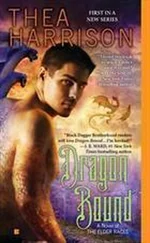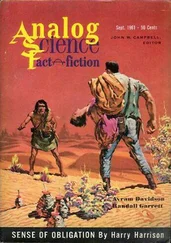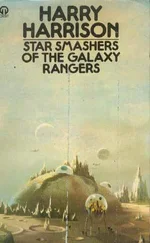'I'll walk,' Ed said. 'No money.'
'No money?'
He shrugged.
'Not much of anything,' he said.
She stared at him with an expression he couldn't interpret.
'I was dying out there,' she said. 'But you took time over me. So I'll run you back to the city.'
'The fact is,' Ed admitted, 'I got nowhere to be, either. No money. Nowhere to be. No reason to be there.' He could see her trying to process this. Her lips moved a little as she looked at him. He understood suddenly that she had a good heart, and that made him feel anxious on her behalf. It made him feel depressed. 'Hey,' he said. 'So what? You don't owe me anything, I enjoyed the ride.' He looked her immense body up and down. 'Your action is good.'
She stared at him puzzledly; then down at herself; and then, across the chain-link fence and the rattling gate in the wind, at the circus by the shore. 'I keep a room over there,' she said. 'See those lights? I bring in custom, they let me have a room. That's the deal I have with them. You want to stay there?'
The gate rattled, the sea air got a little colder. Ed thought about Tig and Neena, what happened to them.
'OK,' he said.
'In the morning you could ask for a job.'
'I always wanted to work in a circus.'
Opening the gate, she looked at him sidelong.
'Kids do,' she said.
The room was hardly bigger than she was, with cheap fibreboard walls that creaked and gave in the sea wind. The walls were off-white, with a couple of loose shelves. There was a toilet and shower in a translucent plastic cubicle in one corner; an induction-oven and a couple of pots and pans in another. She had a futon rolled up against the wall. It was as bleak and transitional a space as you liked, smelling of oil-fried rice and sweat. Cafй йlectrique sweat. Rickshaw-girl sweat. But she had some things of her own on the shelves, which was more than most of them could say. She had two spare Lycra outfits, three old books, and some tissue-paper flowers.
'It's nice,' Ed said.
'Why lie?' she said. 'It's shite.' She indicated the futon. 'I could make us something to eat,' she said, 'or maybe you'd just like to lie down?'
Ed must have looked reluctant.
'Hey,' she said. 'I'm gentle. I never hurt anyone yet.'
She was right. She enfolded him with care. Her olive skin, with its faint down of hair, had a strange strong smell, like cloves and ice. She touched him softly, protected him from her convulsions by coming somewhere deep down inside herself, and gently encouraged him to batter against her as hard as he wanted. When he woke in the night, he found she had curved round him with awkward consideration, as if she was not used to someone being there. The tide was in. Ed lay and listened to the sea roll the stones about in the undertow. The wind hissed. It was soon bluish dawn. He felt the circus begin to wake up around him, though he didn't yet know what that might mean for him. Annie Glyph's tranquil downer breath, the rise and fall of her huge ribcage, soon sent him to sleep again.
In a time like that, who needed a circus? The halo was a circus in itself. Circus was in the streets. It was inside people's heads. Eat fire? Everyone was a fire-eater. Everyone had geek genes and a story to tell. Sentient tattoos made everyone the Illustrated Man. Everyone was high on some flying trapeze issue of their own. It was the flight into the grotesque. The tusked cultivar on Electric Avenue, the twink curled foetally in the twink-tank: whether they knew it or not, they had asked and answered all the questions the universe could support for now. They were their own audience, too.
The only thing you couldn't be was an alien, so Sandra Shen kept a few of those. And prophecy was still popular, because no one could quite do it yet. But in the face of the uniform grotesque, the Circus of Pathet Lao had been forced to look elsewhere for the cheap thrill at the heart of performance, and-through a series of breathtaking acts of the imagination devised and sometimes acted in by Sandra Shen herself-present the vanished normal.
As a result, Ed Chianese's age was able to define itself as the cultural opposite of 'Having Breakfast, 1950'. It could thrill to 'Buying an Underwired Bra at Dorothy Perkins, 1972', or 'Novel Reading, early 1980's', and snigger over the perverse 'A New Baby', and 'Toyota Previa with West London School Children', both 2002. Most extraordinary of all-perched as it was so exactly on the historical cusp-was the astonishing 'Brian Tate and Michael Kearney Looking Into a Computer Monitor, 1999'. These gemlike tableaux-acted out behind glass under powerful lights by the clones of fat men about to have heart attacks on a Zurich metro platform, anorexic women dressed in the Angelino sport-fuck wear of 1982-brought to life the whole bizarre comfortingness of Old Earth. Such desperate fantasies were the real earners. Like fairy godmothers they had blessed the Circus at its inception, funded its early whirlwind travels across the halo, and now supported its declining years in the twilight zone of New Venusport.
Success is often its own downfall. People weren't coming to watch any more. They were coming to get their own ideas. They weren't content to spectate the vanished past; they wanted to be it. The retro lifestyles emerging from the corporate enclaves had less historical accuracy than a Shen tableau but a softer, more buyable feel. The look was 'Dress Down Friday'. It was the Erickson phone and an Italian wool sweater worn across the shoulders with its arms knotted loosely in front. Meanwhile, at the radical edge, a gene tailor and ex-entradista from Motel Splendido was reputed to have made himself over as the exact replica of a Victorian music hall star, using actual DNA.
In the face of competition like that, Madame Shen was thinking of moving on. But there were other reasons for that, too.
You go too deep, you expect to get burned. There isn't any way around that. Ed dreamed of a dipship breaking up in slow motion in the photosphere of a G-type star. The dipship was Ed. Then he dreamed he was back in the twink-tank but the tank world had come apart and he could already hear voices from every cupboard, every corner, every pretty girl's petticoat. Then he woke with a start and it was full day, and he could hear the sea one side of the dunes and the circus on the other. He found two vegetable samosas wrapped in a slip of greaseproof paper, also some money, together with a note which read: Go see the receptionist about work. Annie Glyph's handwriting was as careful and literate as her way of having sex. Ed ate the samosas, looking comfortably around the little room, with the marine light falling into it and the sea air filling it. Then he crumpled the paper, took a shower to get the blood off him, and went out.
Sandra Shen's Observatorium and Native Karma Plant, Incorporating the Circus of Pathet Lao, occupied a two-acre concrete site on the boundary of the noncorporate spaceport.
The Observatorium, housed in a series of bizarre pressure tanks and magnetic vessels, took up less than a quarter of this; while the Circus itself was contained in a single building the curves and volutes of whose composite construction had been designed to resemble a carnival tent. The rest of the compound was living quarters. All exactly what you would expect-weeds, salt-streaked alloy siding, blistered paint, old carnie holograms with no memory of themselves as human, which, faded but energetic, woke into life as you passed, pursuing, hectoring, cajoling. Everyone who worked here would be like that-lively but disconnected. Ed felt like that too. He had to walk across the whole site to find the front office, which was in another clapped-out wooden building, greyish white under a faulty neon sign.
The receptionist wore a blonde wig.
It was big hair, platinum hair, piled high and sold cheap. In front of her she had a holographic terminal of a type with which Ed was unfamiliar. This resembled an old-fashioned fishtank, in which he thought he discerned now and then a stream of bubbles, a fake clamshell open on a miniature mermaid. The receptionist was like a mermaid herself. Older than she looked, she sat demurely beneath her hair, a small woman with a personal sense of humour and an accent he could not place.
Читать дальше












